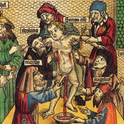It is generally agreed that being the archbishop of Canterbury is an impossible job. In modern times, tenures can begin with modest support and even, occasionally, enthusiasm. It is also generally agreed that by the end of their occupancy of Lambeth Palace, the archbishop will have tried to satisfy everyone and ended up pleasing no one.
Justin Welby’s time as archbishop is now over. He had been accused of not telling the full truth about what he knew of the abuser John Smyth to General Synod—the Church’s legislative body—and to the nation. He knew of the allegations in 2013, yet later said he had been “unaware” of their severity. The challenging chalice of archbishop—some might say poisoned—will soon be passed to another candidate to drain. It is a thankless task, even if on a range of issues Welby has handled it very poorly. In fairness to him, he was given a dreadful hand.
Welby’s appointment in 2013 raised some eyebrows. He’d only been a bishop since 2011 (Durham), and lacked episcopal experience. He came from the conservative and charismatic-evangelical Holy Trinity Brompton network of churches, had a background in the oil industry prior to ordination training and had worked in mediation. Educated at Eton and Cambridge, he was steeped in Tory ancestry and an elitist upper-class pedigree.
The ecclesiocrats who chose him must have assumed that his background rendered him a safe pair of hands for the brief of every archbishop: Make Anglicanism Great Again, and restore its reputation through numerical church growth, good public relations and grand ecclesiastical status theatre. They didn’t bank on the dark side of his upper-class elitism—the one that doesn’t think it ever owes the public an explanation or can be held accountable for its actions.
The dark side eventually came through. Welby’s tenure had evolved into an ecclesiastical Downton Abbey or a dysfunctional Upstairs, Downstairs. Who are these annoying churchgoers making noises about democracy and accountability? Why are these ungrateful victims of abuse not satisfied with another portion of platitudes, a dollop of pastoral care, a promise of prayer and some feeble apology?
To be fair to the outgoing archbishop, what was printed on the label has been a fair reflection of what was inside the tin. A charismatic evangelical, Welby was pragmatically inclined rather than theologically immersive. In that regard, he was a symptom rather than a cause of the crisis in which the Church of England’s leadership now finds itself.
There were some high points during the dozen years of Welby’s archepiscopal reign, not least securing women bishops for the Church of England—albeit with unconscionably large compromises made to those who still resist their ordination. On homosexuality, however, courageous moral decision-making has proved elusive. Under Welby’s watch, the state of the Anglican Communion and the Church of England over homosexuality became far worse.
Welby was on the wrong side of history in 2013 when nine of the 14 bishops tried to scupper the equal marriage bill—it was approved by over 70 per cent of the Lords—and ever since he has struggled to convince both equality campaigners and inclusivity opponents that he is sincere and supportive of their views. The Church’s “Living in Love and Faith” process, an ill-conceived initiative to steer some middle-course between pro- and anti-LGBT campaigners, has been badly managed and engendered much distrust.
The Church’s failure to act justly and properly towards its victims of sexual abuse has played no small part in the collapse of trust in Church leadership that became the hallmark of Welby’s tenure. There were a litany of failures, cover-ups, scandals and associated corruption. The Makin Review into the case of John Smyth—probably the most prolific abuser in recent Church of England history, both in the UK and later in Africa—was delayed and obstructed by Lambeth Palace. In the end, it was more than 1,600 days late and even when heavily redacted was utterly damming.
Every external investigation into safeguarding failures revealed a culture of incompetence, evasiveness and deception, and a failure to act responsibly or even honestly; trust in the Church’s expertise in safeguarding has been irretrievably destroyed. Yet there is little sign of remorse from the hierarchy. Welby and his bishops consistently opposed any independent professional scrutiny of safeguarding practices. For victims of abuse, and those damaged by the Church’s (so-called) “safeguarding systems”, everything the Church of England does is systemic and harrowing re-abuse.
Church lawyers will send threatening “cease and desist” letters to those who complain about the safeguarding process. I have received such letters myself when I have tried to flag the unlawful practices routinely used by the National Safeguarding Team (NST) of the Church of England—as have many others, for repeatedly complaining about injustices. Survivors experience the Church of England’s safeguarding culture as one of cruel bullying autocracy, albeit with the added insult of public statements that assert victims are being cared for. They are not.
In common with other bishops, Welby’s treatment of General Synod was one of barely concealed contempt. The bishops, archbishops and senior civil servants in the Church loathe any notion of accountability or transparency, and treat Synod in much the way that an autocrat might regard the annoying inconvenience of an elected parliament. Currently, Welby had been seeking to reform the governance of the Archbishops’ Council and hierarchy to remove any remaining prospects of accountability. General Synod, suffering from narcolepsy, seems unaware of its imminent demise.
Welby’s admiration of business leaders and fixation with quasi-executive power created an unwise and jarring culture in the leadership of the Church. Welby’s championing of “talent pipelines” for the next generation of leadership resulted in the manufacture of compliant clones who are selected and then quality-controlled by unaccountable middle-management ecclesiocrats.
The resulting culture was a blend of minor monarchical entitlement and a kind of executive management that is, in turn, shaped by outdated corporate-management rhetoric and ill-fitting organisational theory. It left the leadership unable to fathom how and why they are perceived as being unworthy of trust. It will be hard for any successor to retrieve what Welby has lost.
Some of the reforms enacted over the last 12 years will leave future generations puzzled. For example, every new diocesan bishop is now required to make their diocese adopt a three-word strapline, as though this were some kind of slick marketing operation. One diocese opted for “Wider, Younger, Deeper”, seemingly unaware of risible connotations. Similarly, I recall a conference on church growth not so long ago, entitled “Explore, Expand, Explode”. The sheer silliness borders on utter trivialisation.
Welby’s successor will have little cash to spend on improving the Church‚ so much having been frittered away on speculative initiatives aimed at mission and growth, with little in place to measure their effectiveness and impact. A hallmark of his leadership has been the gambling of present income and assets on hypothetical future successes.
Much of this was outlined in Welby’s 2015 manifesto, “Renewal and Reform”, which General Synod was asked to approve a decade ago. To date, not one target has been hit, and most of the problems the document sought to address have become considerably worse. In 2034 the Church of England, which will be at the 500th anniversary of its creation under Henry VIII, is projected to have around 5,000 paid clergy—half of the number employed when Welby was ordained in 1992. In the same period, the population of England will have increased by a third or more. Trust and confidence in the Church of England’s leadership is in freefall, and it is hard to see this being reversed by any successor. There is no obvious means for making Anglicanism great again. It has diminished beyond the possibility of repair.
Meanwhile, Church of England attendance figures have fallen off the proverbial cliff, despite Welby’s assertions to the contrary. Anyone pointing to the statistics will be told they are wrong, and that under Welby the Church of England has been growing, or is bouncing back. Statistics tell another story: one of decline.
Welby’s reform of the Church of England’s finances ultimately sired a culture that backed winners and disregarded losers. If your parish or diocese made a successful bid for funds, you were a winner, and the rewards were handsome. But if your bid did not catch the eye of the Church leadership, penury and cuts awaited.
In 2025, almost 40 dioceses will post recurring budget deficits, and their only means of plugging those gaps will be to sell more property and cut back on clergy posts. Yet complaining about this direction of travel will not help. Bishops report censure and bullying if they dare to question or defy Lambeth Palace and its directives. Threats include less financial support unless the bishop toes the line. During one recent cosy fireside chat at Lambeth Palace, the editor of a leading church newspaper was told that if they were too critical of Welby advertising revenue would be withdrawn, thereby causing the paper to quickly go out of business.
The culture itself has rotted, and now needs surgical amputation. Bishops and their senior advisers have no accountability, are aloof from any democratic mandate and averse to external regulatory oversight. They will lecture the rest of the world on democracy and equality, but would rather burn in hell than see it come home to their diocese.
Under Welby, loyalty became more important than truth, and obeisance was prioritised over justice. His leadership was like a quasi-regal court, replete with courtiers and advisers supporting a culture of self-serving sycophancy. It was a culture of patronage and bullying, and the vast majority of bishops appointed under Welby were products of this schooling. The prophets and thinkers were packed off long ago, and have been replaced by officers loyal to the new marketing brand.
Welby’s legacy is already one where optics matter more than justice, and unity is more important than truth. “What power have you got?” Tony Benn famously asked those in authority. “Where did you get it from? In whose interests do you exercise it? To whom are you accountable? And how can we get rid of you?” If the answer to every one of those questions is “only God, or possibly the King”, then the stage is fully set for open revolt by the churches. But episcopal culture has too much to lose by accountability, transparency and democracy. The culture will double down.
Welby’s time is now up. The bishops and their senior advisers circled like vultures, high overhead. It is an ironic end, after Welby had quickly criticised others to make it look like the Church of England took safeguarding seriously. He was the architect of finding expedient sacrifices to make it appear he was tough and resolved in the safeguarding sphere. This has never been true, and all the energy and cash has been spent on giving the appearance of progress rather than actual changes.
It is the ultimate irony that it is Welby’s turn to be that sacrifice, but his resignation will resolve nothing on its own. The entire senior ecclesiastical culture is rotten to the core, and it needs to be subject to a public statutory inquiry leading to proper external regulation. Otherwise, there will be no trust in the Church in future. Several dozen episcopal resignations—though undoubtedly welcome—will not change that.
So, after Welby, who or what is likely to come next? Assuming that the ecclesiocrats who ushered in the Welby era are still around, democracy, external scrutiny, independent auditing and transparency will remain firmly off the agenda. Let us remember that Lambeth Palace and virtually all bishops oppose professional independent external regulation of their work. They will doubtless find another candidate to try to make the Church look great again—but the answer cannot lie with some mild cosmetic reform and modest renewal. A revolution is needed, and if it doesn’t happen soon there may not be much left to lead. The Church of England cannot afford to repeat the past.












